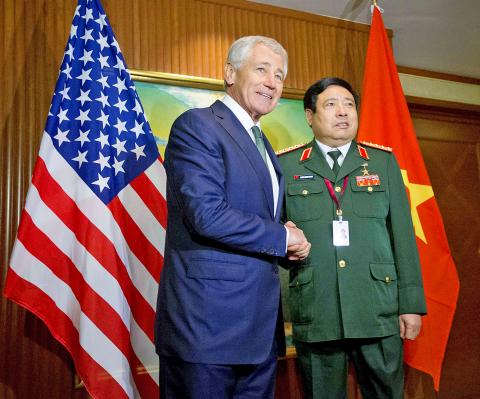The US and China squared off at an Asian security forum yesterday, with the US defense secretary accusing Beijing of destabilizing the region and a top Chinese general retorting that the comments were a “threat and intimidation.”
Using unusually strong language, US Secretary of Defense Chuck Hagel took aim at Beijing’s handling of territorial disputes with its Asian neighbors.
“In recent months, China has undertaken destabilizing, unilateral actions asserting its claims in the South China Sea,” Hagel said.

Photo: AFP
He warned Beijing that the US was committed to its geopolitical rebalance to the Asia-Pacific region and “will not look the other way when fundamental principles of the international order are being challenged.”
Hagel said the US took no position on the merits of rival territorial claims in the region, but added: “We firmly oppose any nation’s use of intimidation, coercion or the threat of force to assert these claims.”
His speech at Singapore’s Shangri-La Dialogue, Asia’s biggest security forum, provoked an angry reaction from the deputy chief of staff of the Chinese Army, Lieutenant-General Wang Guanzhong (王冠中).
“I felt that Secretary Hagel’s speech is full of hegemonism, threat and intimidation,” he told reporters just after the speech.
Wang said the speech was aimed at causing trouble in the Asia-Pacific.
Hagel’s comments followed the keynote address by Japanese Prime Minister Shinzo Abe at the same forum on Friday evening, who pledged “utmost support” to Southeast Asian countries, several of which are locked in maritime disputes with China.
“I felt that they were just trying to echo each other,” Wang said.
Hagel later held a bilateral meeting with Wang, where the Chinese military leader expressed his surprise at the US defense secretary’s speech.
“You were very candid this morning, and to be frank, more than our expectations,” he said. “Although I do think those criticisms are groundless, I do appreciate your candor, likewise we will also share our candor.”
A senior US defense official said that, despite Wang’s opening remarks, the tone of the meeting had been “businesslike and fairly amicable.”
While Hagel went over ground he covered in his speech, Wang spent most of the meeting talking about US-China military-to-military contacts, including Chinese participation in forthcoming military exercises, the official said.
Wang, China’s deputy chief of staff, also snubbed an offer for talks with Japan made by Japanese Minister of Defense Itsunori Onodera, the China News Service said.
“This will hinge on whether the Japanese side is willing to amend the erroneous policy towards China and improve relations between China and Japan,” he said. “Japan should correct its mistakes as soon as possible to improve China-Japan ties.”
“To ensure that the rebalance is fully implemented, both President Obama and I remain committed to ensuring that any reductions in US defense spending do not come at the expense of America’s commitments in the Asia-Pacific,” he said.

The US government has signed defense cooperation agreements with Japan and the Philippines to boost the deterrence capabilities of countries in the first island chain, a report by the National Security Bureau (NSB) showed. The main countries on the first island chain include the two nations and Taiwan. The bureau is to present the report at a meeting of the legislature’s Foreign Affairs and National Defense Committee tomorrow. The US military has deployed Typhon missile systems to Japan’s Yamaguchi Prefecture and Zambales province in the Philippines during their joint military exercises. It has also installed NMESIS anti-ship systems in Japan’s Okinawa

‘WIN-WIN’: The Philippines, and central and eastern European countries are important potential drone cooperation partners, Minister of Foreign Affairs Lin Chia-lung said Minister of Foreign Affairs Lin Chia-lung (林佳龍) in an interview published yesterday confirmed that there are joint ventures between Taiwan and Poland in the drone industry. Lin made the remark in an exclusive interview with the Chinese-language Liberty Times (the Taipei Times’ sister paper). The government-backed Taiwan Excellence Drone International Business Opportunities Alliance and the Polish Chamber of Unmanned Systems on Wednesday last week signed a memorandum of understanding in Poland to develop a “non-China” supply chain for drones and work together on key technologies. Asked if Taiwan prioritized Poland among central and eastern European countries in drone collaboration, Lin

Renewed border fighting between Thailand and Cambodia showed no signs of abating yesterday, leaving hundreds of thousands of displaced people in both countries living in strained conditions as more flooded into temporary shelters. Reporters on the Thai side of the border heard sounds of outgoing, indirect fire yesterday. About 400,000 people have been evacuated from affected areas in Thailand and about 700 schools closed while fighting was ongoing in four border provinces, said Thai Rear Admiral Surasant Kongsiri, a spokesman for the military. Cambodia evacuated more than 127,000 villagers and closed hundreds of schools, the Thai Ministry of Defense said. Thailand’s military announced that

CABINET APPROVAL: People seeking assisted reproduction must be assessed to determine whether they would be adequate parents, the planned changes say Proposed amendments to the Assisted Reproduction Act (人工生殖法) advanced yesterday by the Executive Yuan would grant married lesbian couples and single women access to legal assisted reproductive services. The proposed revisions are “based on the fundamental principle of respecting women’s reproductive autonomy,” Cabinet spokesperson Michelle Lee (李慧芝) quoted Vice Premier Cheng Li-chiun (鄭麗君), who presided over a Cabinet meeting earlier yesterday, as saying at the briefing. The draft amendment would be submitted to the legislature for review. The Ministry of Health and Welfare, which proposed the amendments, said that experts on children’s rights, gender equality, law and medicine attended cross-disciplinary meetings, adding that